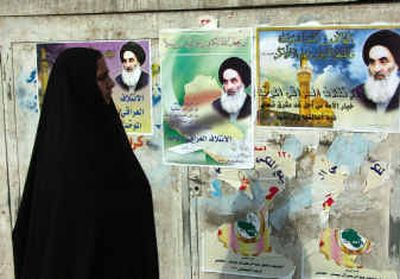Threat of violence mutes New Year’s Eve in Iraq

BAGHDAD, Iraq – A car bomb Friday wounded five members of the Iraqi National Guard and killed two civilians near the northern town of Beiji, while residents of Baghdad and other major cities spent New Year’s Eve under threat of a three-day “curfew” imposed by an insurgent group bent on attacking U.S. targets.
Amid an official nighttime curfew imposed by the interim Iraqi government and enforced by U.S. troops and Iraqi police, the streets of Baghdad were quiet most of Friday night as families stayed home to mark the end of a bloody and disappointing calendar year.
“I am not celebrating tonight because of the security situation,” said Ahmed Sami, a 24-year-old computer science student. “Beyond that, there are a lot of areas in Iraq living in tragedy, such as Fallujah. We used to celebrate every New Year’s Eve with my friends. But the circumstances were good then.”
Iraqi and U.S. authorities dismissed the warning from the Ansar al-Sunnah Army for Iraqis to stay home Thursday, Friday and today. Some Baghdad residents downplayed it as well, saying threats had become commonplace in Iraq. “They are just like dogs barking,” one Iraqi said.
People stayed in nonetheless.
“I am not celebrating tonight. We did it last night, because we thought something bad would happen tonight,” said businessman Waleed Tariq, 38, recalling the bombing last New Year’s Eve of Nabil, a popular Baghdad restaurant. This year, he said, “we sat in a friend’s house, drank and watched music on television.”
In a New Year’s Eve address broadcast on state television, interim Prime Minister Ayad Allawi sought to reassure Iraqis that security would be a paramount concern for national elections scheduled for Jan. 30.
The Ansar al-Sunnah Army and other insurgent groups have vowed to disrupt the elections, which they denounce as being dictated by an occupying power or, because of their democratic nature, being antithetical to Islam.
Some Sunni Muslim leaders, meanwhile, have called for the vote to be postponed. They say the violence and instability will make a representative turnout impossible, particularly in the predominantly Sunni areas that have been hit hardest by the insurgent conflict.
“Iraq will be solid and strong in its political and social system, a united Iraq in a stable and secure region,” Allawi said. “I am Iraqi and I wish my good nation a happy new year and I hope it brings to Iraqis and the whole world happiness, prosperity and stability, God willing. The new year will be decisive in the history of our nation and its future.”
The car bombing in Beiji targeted the guardsmen, but the explosions destroyed a passing car and killed its occupants, a military official said. There were conflicting reports of whether guardsmen were killed or wounded. A guardsman was also shot dead and six others were wounded in a shootout Friday in Mahmudiyah, according to news reports.
And north of Fallujah the body of a National Guard member was found with a note attached that said: “This is the fate of anyone who collaborates with the occupation forces.”
Near the town of Duluiyah, between Baghdad and Beiji and near Saddam Hussein’s hometown of Tikrit, U.S. soldiers detained 49 people they said were suspected of insurgent activity. Soldiers confiscated bomb-making equipment, a global positioning system and a cellular telephone, said officials with the 1st Infantry Division.
Tikrit has been mostly under control, a senior Western official said this week. But guerrillas stormed a police station in the area Tuesday, seized 12 officers, slit their throats and blew up the station. That attack was one of several insurgents carried out on police stations, the official said, but in the others police repelled the guerrillas.
Also Friday, the group led by Abu Musab al-Zarqawi claimed responsibility for the attacks Wednesday on a U.S. Army outpost in Mosul.
That operation, which left one U.S. soldier dead and several wounded, involved two suicide bombings and waves of attacks by armed fighters. But the Americans held their ground, called in airstrikes and killed 25 insurgents, the military said.